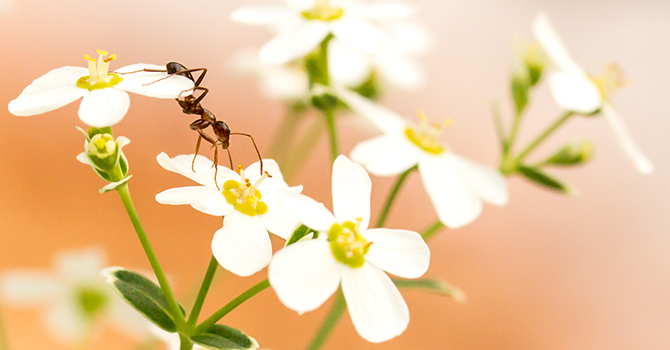Over several sunny June days this spring, clumsy blackish-brown insects with long, transparent wings were crawling up our living room wall onto the windowsill.
I recognized them as the reproductive stage (males and future queen females) of the pavement ants (Tetramorium caespitum) that create small sand piles along a crack in our terrace.
Periodically, I scooped them up and gently transported them outdoors, where they could mate and start a new colony. We had also found pavement ant workers in our home early in the spring searching for food. My guess is that we have a large colony living under our terrace.
I realize that my response to finding ants in my home is unusual -- most people would pull out the bug spray. The human response to small organisms generally is a combination of innate fears, related to safety and cleanliness, and cultural norms.
The fear of insects and spiders may go back to our hunter-gatherer ancestors, for whom incapacitation from a poisonous bite might prove fatal. There’s also social reinforcement for calling them icky. And they do appear a little alien.
Insects breathe through their sides, taste with their feet, have compound eyes and sport antennae. Philosophers from Aristotle through Descartes and beyond have suggested that since insects lack rationality, they have no moral value -- so killing bugs cannot be wrong.
Today, though, biologists and philosophers are beginning to see things a little differently. We are learning that insects may have greater consciousness and learning capabilities than originally thought. They are not mere machines, as Descartes believed.
But should the capabilities of the many tiny living beings in and around our homes determine whether we should care about them?
I think the Christian view, and that of other world religions, is that even these smaller lives have value in and of themselves. They are a very big part of a creation that God called good.
Many of us envision creation as soaring eagles, hulking bears and stately redwoods. Yet the less-charismatic nature that we see every day around our homes, such as insects and weeds, is part of God’s creation as well.
What we used to consider an evolutionary tree of life, with human beings at the tip of the uppermost branch, is more like a big, bushy shrub composed mainly of a lot of bacteria and invertebrates, such as insects. Human beings and their primate relatives might be a twig on that bush.
That is the reality of God’s creation. And all of it, including “creeping things,” is invited to praise God (Psalm 148:10 NRSV).
The Bible advises us, “Go to the ant, you lazybones; consider its ways, and be wise” (Proverbs 6:6), suggesting an attitude of human humility, with greater interest in the smaller beings around us.
The ants I found in my living room, for example, are common in North American homes, but the species is an immigrant from Europe -- first transported here in soil ballast on sailing ships. It is the most common ant on street medians in New York City and may remove up to 60% of the food and debris dropped on that city’s sidewalks.
An internet search on pavement ants reveals mainly sites describing how to eradicate them. Conversely, when asked what to do about ants in a home, entomologist Edward O. Wilson replied that you should feed them a few crumbs and watch them. Sounds outlandish, doesn’t it?
But following Wilson’s advice, we might benefit from observing pavement ant leadership behavior. Scout ants find food -- maybe that crumb you’ve dropped -- return to the nest and recruit other workers. Those scouts then return to the food with followers in tow.
Pavement ants are not particularly good leaders. They don’t pay attention to their followers and tend to lose up to half of them along the way. But scientists find that lead ants that walk slowly and travel in a straight line have greater success in retaining their groups. Perhaps this is ant wisdom for human leaders.
In addition to the pavement ants, I’m surrounded in my home by a variety of spiders, pill bugs and flies -- not to mention vast numbers of bacteria and fungi. And an even greater variety of creatures are just outside my back door.
I like to think I have a relationship of mutual respect with the zebra jumping spider (Salticus scenicus) that I often find on my chair outdoors. And I enjoy the spotted-wing drosophila fruit flies (Drosophila suzukii) that land on my glass when I’m sitting outside in the evening -- even though they occasionally take a fatal plunge into my wine.
Our homes and gardens are full of nature, some welcome and some uninvited. I suggest that we can enjoy and appreciate some of the less-welcome varieties of creation.
Dandelions and crabgrass have amazing adaptations that make them successful in human-constructed environments. House centipedes are not harmful and can coordinate 15 pairs of very long legs in a way that makes them speedy predators of insects and spiders. Relatives of the small fruit flies that visit my wine glass have contributed immensely to our knowledge of genetics and biology.
And while the pavement ants can be troublesome in the kitchen, they are mostly benign. I enjoy seeing them in their occasional forays into our home, and their life under and around the terrace seems to agree with them. Left to their own devices, they may even keep the house a little cleaner!
You might say that how we relate to nature begins at home. It is in and around our homes that we interact most frequently and in greater intimacy with other species. And it is here that we have an opportunity to practice humility, respect and appreciation toward the tiny creatures that share our space.
A positive approach to organisms in the habitats we create bodes well for our relationship with the broader environment. Forbearance toward pavement ants, spiders and fruit flies connects us in a more positive way to the rest of creation.
Next time you see small, sandy mounds on the pavement, step around them, drop a crumb and take a moment to see what happens next!













